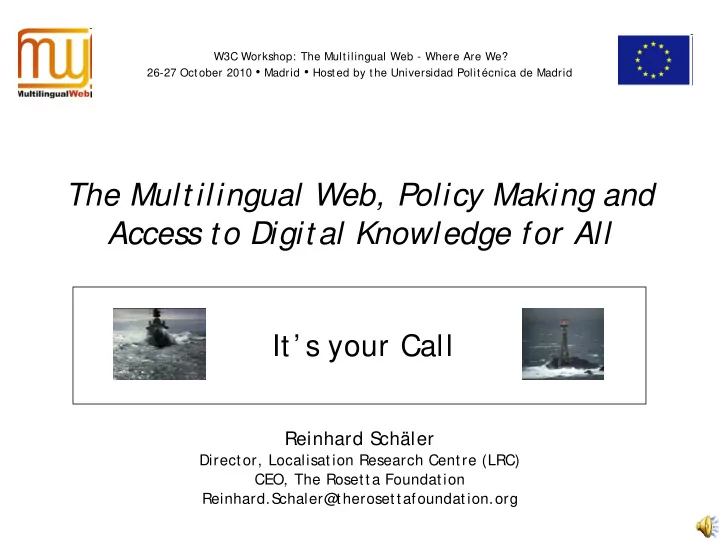

W3C Workshop: The Multilingual Web - Where Are We? 26-27 Oct ober 2010 • Madrid • Hosted by the Universidad Politécnica de Madrid The Mult ilingual Web, Policy Making and Access t o Digit al Knowledge for All It’ s your Call Reinhard S chäler Director, Localisation Research Centre (LRC) CEO, The Rosett a Foundation Reinhard.S chaler@ therosettafoundation.org
Ludwig Josef Johann Wittgenstein 1889 – 1951 If a lion could t alk, we would not underst and him
Muhammad Yunus 1940 - today Everybody will read and hear everyt hing in his own language. Technology will make it possible for a person t o speak, read and writ e in his own language while t he list ener will hear and t he reader will read t he message in his own language.
+ S tandards + • Standards are good for business • Necessary to exchange information • Essential for the movement of goods • Precondition for commoditisation
S tandards in L10N • Encoding (e.g. Unicode) • Quality (e.g. Lisa QA) • L10N Data Exchange (e.g. XLIFF, TMX) • Metrics
Result (use of standards) At a bus stop 10:05am • “ Stuff” becomes (more) predictable • Closed knowledge remains protected • “ Standard compliance” sells products • Buses run on time
S tandards – the Downside • Standards are bad for business • They require compromise • On a level footing with competitors • Language is colourful, standards are grey
S tandards in L10N? • Standards – one for everybody • Interoperability – with competitors? ! • Data Exchange – great for data import • Process Management – build your own
Where are we? • A US$19b industry • Highly fragmented, some dominant • Short-term financial ROI oriented • Who can drive change, standards, MLW?
No. standards orgs. No. of standards S urvey 16+ 36+ • <5 organisations, >10 standards Answers • Customers ensure standards compliance • Need focus on reference implementation • Need free, accessible, global framework
Benefits: L10N for All • More: people, languages, content • User: driven, managed, owned • Networks: standards-based, interoperable • Focus: implementation, people’s benefits
A Fundamental Human Right • Knowledge is power: justice, environment, economic well- being, education, health, … • Access is a fundamental human right; It does not require a business case
Who can drive Change? • Nonprofit sector (US$1.6 trillion revenue) • Motivation is key: it’s for a better world • Nonprofit translation = the world’s largest translation movement
Free Accessible Global Framework Don’ t know what we’ ve been wait ing for? Dynamic Coalition for a Global Localization Platform: Localization4all • Collaboration: UN’s IGF Working Group – Open Source and Nonprofit Communities – Industry, commercial stakeholders – EU, other intergovernmental organisations
It’ s your Call • The Multilingual Web and S tandards today – Dominated by powerful commercial interests, sharing for a fee – “ Open” proprietary innovation – Unconnected bodies; closed “ communities” – Focus on standards development, not reference implementations • What can change the course of powerful interest groups?
In Localisation, Standards, and the MLW - who/what would be: (1) Captain Hancock (2) The USS Montana, “the second largest vessel in the North Atlantic fleet” (3) The measures “to ensure the safety of this ship”
It’s all about communication standards, access to technology, and skill… At some unspecified time, in some unspecified place somewhere in some section of some North American desert…
Localization for All (2010 – 2020) If aliens could t alk, we would not underst and t hem but we could try and technology would help
Localization4all Localization4all started as a project by the Localisation Research Centre at the University of Limerick supported by the students of the Graduate Diploma in Localisation Technology, Daniel Goldschmidt and Thomas Arend. It is now running under the aegis of the UN’s Internet Governance Forum. www.localization4all.com ASLIB TC32: London, 18-19 Dec 2010 http://www.aslib.com/training/conferences/tc_2010.htm http://www.surveymonkey.com/s/C5TQWTN
• Who determines the course of action? • What gives legitimacy to standards authority? • Which direction should we be taking? • Who should benefit?
Recommend
More recommend